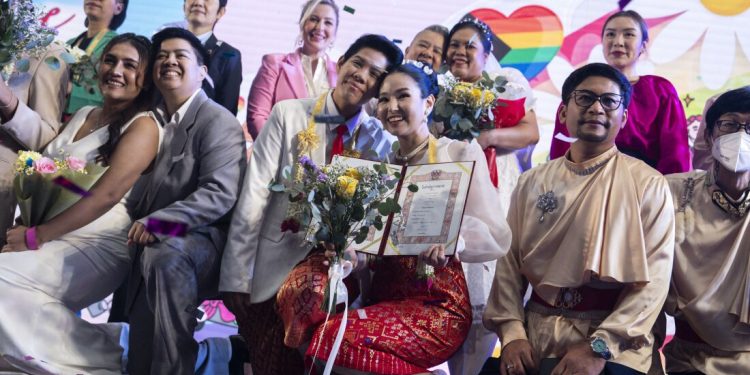
Same-sex couples pose for photos during a marriage registration event at Paragon Mall in Bangkok on Thursday.
Chanakarn Laosarakham/AFP via Getty Images
hide caption
toggle caption
Chanakarn Laosarakham/AFP via Getty Images
SINGAPORE — Hundreds of same-sex couples tied the knot across Thailand on Thursday, as the country became the first in Southeast Asia to legally recognize marriage equality.
A luxury shopping mall in Bangkok alone hosted more than 150 same-sex weddings, as members of the LGBTQ+ community celebrated the historic decision.
“I feel more secure in our life because we can be a family and be recognized as a couple in society,” Anticha Sangchai told NPR.
Sangchai was finally able to legally certify his marriage to his wife Vorawan Ramwan, more than two years after their initial wedding ceremony.
“It’s special for us because it’s a historic day in Thailand,” Sangchai said.

Anticha Sangchai and Vorawan Ramwan attend the signing of their marriage certificate in Bangkok, Thailand, on Thursday.
Adam Hancock
hide caption
toggle caption
Adam Hancock
Thailand’s parliament passed the landmark same-sex marriage bill last June, joining Taiwan as the only country in Asia to recognize marriage equality.
“Thailand is the perfect country to do it because the society is really gay-friendly,” said Tom Tan, owner of GCircuit, organizer of Asia’s largest gay dance festival.
“Basically, you can just be gay and everything is fine in Thailand,” Tan told NPR.
The new legislation means that same-sex couples will now have the same legal recognition as heterosexual couples, including full financial, medical and legal rights.
“It’s more about building a life together and having the legal rights to protect what we build together,” said Tan, a Singaporean national who is considering legalizing his marriage to his Thai partner.
The same-sex marriage bill was signed into law by Thailand’s King Maha Vajiralongkorn last June, after decades of campaigning by LGBTQ+ activists. The battle for marriage equality in Thailand has long been hampered by the country’s turbulent domestic politics, including the 2014 military coup.
“This has made it extremely difficult for Parliament to move this bill forward, or even to have discussions about gender justice,” said Plaifah Kyoka Shodladd, LGBTQ+ activist and member of the Gender Equality Select Committee. Thai parliament wedding.
Shodladd credits a wave of youth pro-democracy protests in 2020 with reviving the movement to recognize same-sex marriage.
“This has prompted political parties to campaign for LGBTQ+-related laws and policies, as it has become a landmark policy aimed at winning the popular vote of the younger generation,” Shodladd said.

Former Thai Prime Minister Srettha Thavisin (right) arrives with same-sex couples at a marriage registration event at Paragon mall in Bangkok on Thursday.
Manan Vatsyayana/AFP via Getty Images
hide caption
toggle caption
Manan Vatsyayana/AFP via Getty Images
The new bill also grants same-sex couples the right to adopt. However, according to Tom Tan, there are still cultural biases that need to be overcome.
“The next step will be for society to fully accept that gay parents can have children and that children have gay parents and not be teased at school,” Tan said.
Tan says there could be a long way to go before other Southeast Asian countries take similar steps to recognize marriage equality. In his native Singapore, same-sex marriage remains illegal, although the government in 2022 repealed a law that criminalized sexual relations between men.
“I feel things are moving, but obviously not as fast as in Thailand,” Tan said. “I still think it will take time in Singapore.”
But Tan and his partner Oui plan to officially recognize their marriage in Thailand later this year.
Both men are “super happy and excited,” says Tan, as Thailand embraces its status as a hub for the LGBTQ+ community in the region.


